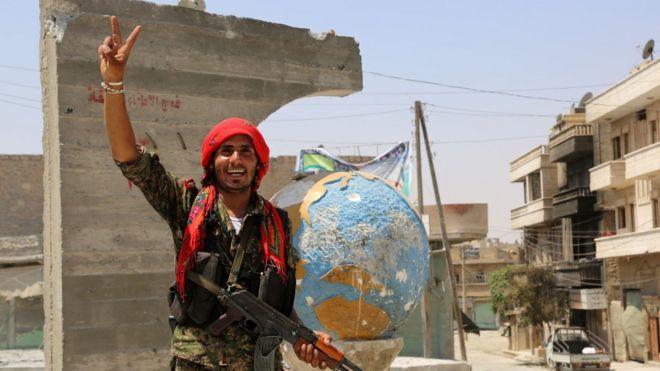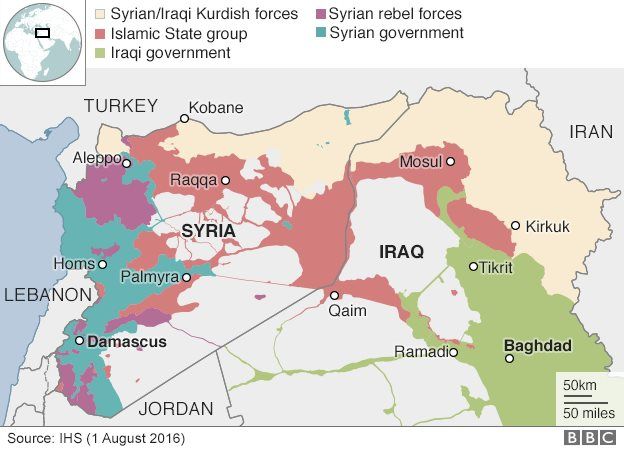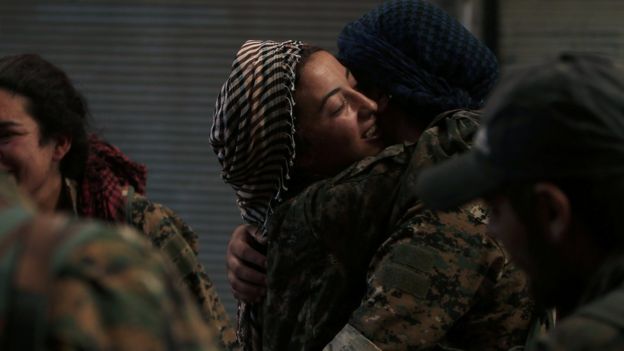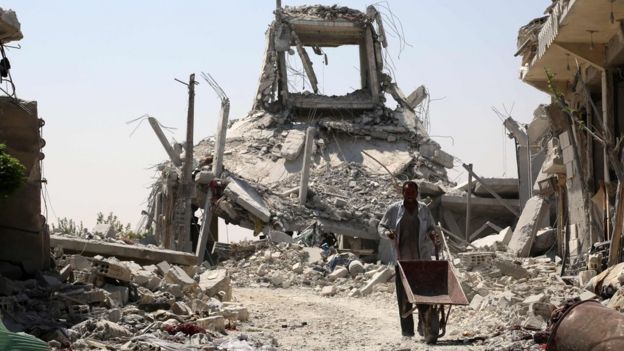
The Kurdish-led Syrian Democratic Forces delayed their final assault on Manbij for weeks
After months of preparation and 10 weeks of fierce fighting, a US-backed alliance of Kurdish and Arab fighters, the Syrian
Democratic Forces (SDF), took full control of Manbij on Friday after driving Islamic State (IS) militants from the strategic town.
Manbij is the second largest town in the northern province of Aleppo and is situated close to the River Euphrates and the Turkish border.
For two-and-a-half years, foreign jihadists travelling into and out of Syria passed through the town, which sits on the main road linking the de facto IS capital of Raqqa to Turkey. The road was also used by the group to smuggle weapons and goods.
The Kurdish-led SDF could have retaken Manbij in early June, when its fighters encircled the town, but concern over the fate of its civilian population prevented them from advancing rapidly.
For weeks, SDF commanders negotiated with IS militants in Manbij in an effort to persuade them to leave, to avoid civilian casualties and damage to infrastructure.
The militants agreed, but on the condition that they were allowed to take their heavy weapons with them. The SDF rejected the demand and last week launched a final assault on the town.
The militants eventually resorted to using 2,000 civilians as human shields to ensure they could escape.
Though successful, the retreat will damage the reputation of IS among its sympathisers.
Victory in Manbij was made possible by a combination of motivated and well-organised SDF fighters and effective US-led coalition air strikes guided by Western special forces personnel on the ground.
If the SDF is able to capture Raqqa, it would be a significant and symbolic victory for the coalition. It might also boost the Democratic Party's chances in the US presidential election in November, by showing that Barack Obama's policy is working without putting American boots on the ground.
But Raqqa is not a Kurdish city and the Kurds have other priorities.
After months of preparation and 10 weeks of fierce fighting, a US-backed alliance of Kurdish and Arab fighters, the Syrian
Democratic Forces (SDF), took full control of Manbij on Friday after driving Islamic State (IS) militants from the strategic town.
Manbij is the second largest town in the northern province of Aleppo and is situated close to the River Euphrates and the Turkish border.
For two-and-a-half years, foreign jihadists travelling into and out of Syria passed through the town, which sits on the main road linking the de facto IS capital of Raqqa to Turkey. The road was also used by the group to smuggle weapons and goods.
The Kurdish-led SDF could have retaken Manbij in early June, when its fighters encircled the town, but concern over the fate of its civilian population prevented them from advancing rapidly.
For weeks, SDF commanders negotiated with IS militants in Manbij in an effort to persuade them to leave, to avoid civilian casualties and damage to infrastructure.
The militants agreed, but on the condition that they were allowed to take their heavy weapons with them. The SDF rejected the demand and last week launched a final assault on the town.
The militants eventually resorted to using 2,000 civilians as human shields to ensure they could escape.
SDF fighters could only watch from a distance as the jihadists left Manbij in a 500-vehicle convoy and headed for the nearby IS-held town of al-Bab.


Though successful, the retreat will damage the reputation of IS among its sympathisers.
Victory in Manbij was made possible by a combination of motivated and well-organised SDF fighters and effective US-led coalition air strikes guided by Western special forces personnel on the ground.
The formula will likely also be used by the coalition and its allies to take other IS-held areas, particularly Raqqa, which the US wants the Kurds to have as their next objective.
Syria's Kurds wants to connect the canton of Afrin with the rest of what they call "Rojava"

Syria's Kurds wants to connect the canton of Afrin with the rest of what they call "Rojava"
If the SDF is able to capture Raqqa, it would be a significant and symbolic victory for the coalition. It might also boost the Democratic Party's chances in the US presidential election in November, by showing that Barack Obama's policy is working without putting American boots on the ground.
But Raqqa is not a Kurdish city and the Kurds have other priorities.
In a clear indication of the direction in which they want to move, SDF commanders announced the establishment of the al-Bab Military Council soon after capturing Manbij.

The SDF handed over control of Manbij to a civilian council days after recapturing the town
Al-Bab, 50km (30 miles) south-west of Manbij, and Jarablus, 30km (18 miles) to the north, are the last two large towns near the Turkish border still controlled by IS. If they fall, jihadists will no longer be able to enter or leave Syria via its northern neighbour.
By capturing al-Bab, the Kurds would also connect the western canton of Afrin to the rest of the region they call "Rojava", or "Western Kurdistan".
Turkey's government is also opposed to the SDF pushing westwards, and has declared the 100km (60 mile) stretch of border from Jarablus to Azaz, a rebel-held town close to Afrin, a no-go zone for the Kurds.
Ankara sees no distinction between the Kurdish Popular Protection Units (YPG) - whose 25,000 fighters dominate the SDF's 30,000-strong force - and the Turkish Kurdistan Workers' Party (PKK), which it considers a terrorist organisation.
While they have also designated the PKK a terrorist group, the US and other Western countries view the Syrian Kurds as their allies and the most effective force against IS on the ground in Syria.
Al-Bab, 50km (30 miles) south-west of Manbij, and Jarablus, 30km (18 miles) to the north, are the last two large towns near the Turkish border still controlled by IS. If they fall, jihadists will no longer be able to enter or leave Syria via its northern neighbour.
By capturing al-Bab, the Kurds would also connect the western canton of Afrin to the rest of the region they call "Rojava", or "Western Kurdistan".
The SDF's priority is therefore to continue their advance from Manbij south-westwards along the M4 motorway to al-Bab, and not south-eastwards towards Raqqa, as the Americans want.

Turkey's government is also opposed to the SDF pushing westwards, and has declared the 100km (60 mile) stretch of border from Jarablus to Azaz, a rebel-held town close to Afrin, a no-go zone for the Kurds.
Ankara sees no distinction between the Kurdish Popular Protection Units (YPG) - whose 25,000 fighters dominate the SDF's 30,000-strong force - and the Turkish Kurdistan Workers' Party (PKK), which it considers a terrorist organisation.
While they have also designated the PKK a terrorist group, the US and other Western countries view the Syrian Kurds as their allies and the most effective force against IS on the ground in Syria.

No comments:
Post a Comment